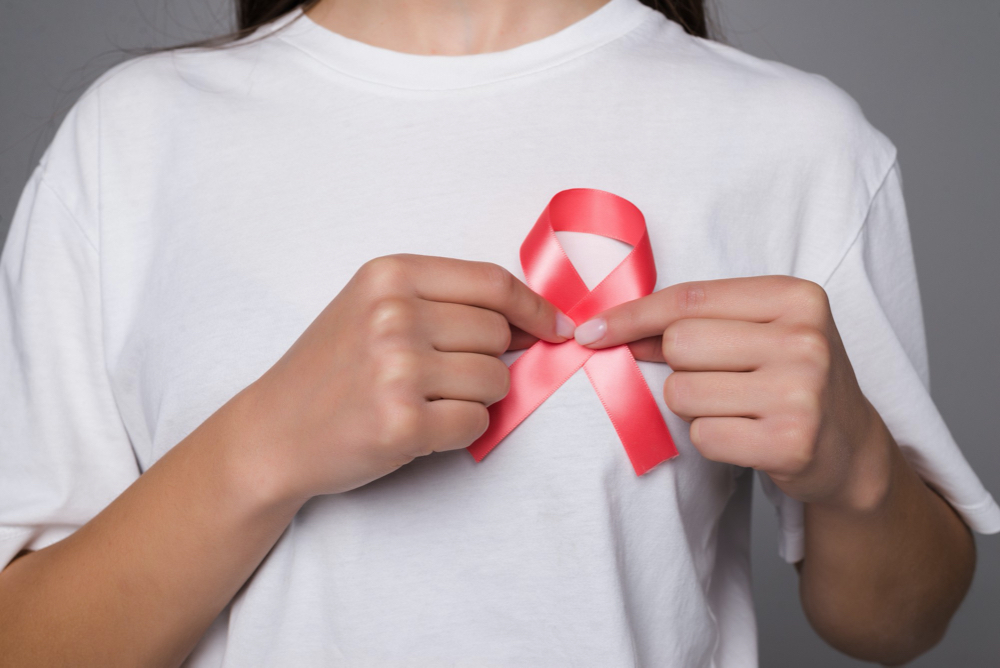- Fast results
- 4,000+ locations
- 4.8 star rating
Need Help? (888) GET LABS


Breast cancer requires proper laboratory testing from detection to post-treatment to increase your chance of survival and recovery. While your doctor determines which test you need, it’s crucial to understand how they work and what they are for.
Lab tests for diagnosing breast cancer include imaging testing (mammogram, ultrasound, MRI) and biopsy. For treatment recommendations, your doctor may order genomic testing. To check the treatment progress, you will need blood tests like CBC and breast cancer marker blood tests to check the treatment progress.
Find out more about these breast cancer lab tests as you read on.
At the onset of breast cancer symptoms, your physician will recommend imaging tests to look for lumps that might potentially be malignant tumors (cancer cells). These tests may also come after the breast examination, wherein your doctor spots critical changes in the breast.
A mammogram provides an x-ray image that shows your breast tissues. The results will reveal unusual masses or lumps in each breast. However, finding these irregularities in your breast does not automatically imply cancer, as the bumps may be benign (non-cancerous).
Aside from being a diagnostic tool to screen breast cancer, a mammogram is also recommended as part of female wellness checkups, especially for women at risk.
Like a mammogram, magnetic resonance imaging (MRI) produces results that reveal masses and lumps. A breast MRI is often ordered to support the mammogram if the image isn’t clear or if there’s a need to locate further and determine the size of the mass.
For women who cannot undergo a mammogram or MRI, the breast ultrasound is the safest option to get a clear image of the breasts. The procedure doesn’t require radiation or dye. Thus, pregnant women, those with dense breast tissue, and young women below 25 can consider it an option.
After the imaging tests confirm the presence of a suspected tumor, your doctor will likely request a biopsy. This procedure involves the removal of a tissue sample for further testing in the lab.
Breast biopsies can be incisional or excisional. The difference between the two is that incisional biopsy is a lighter procedure wherein only a part of the lump or affected area is removed. In contrast, excisional biopsy requires the surgical removal of the whole tumor.
Which biopsy your doctor recommends depends on several factors, like the lump size, its location, etc. Nonetheless, the procedure will determine if the extracted tissues contain cancer cells.
Genomic testing is usually requested to determine the best course of treatment after a breast cancer diagnosis. It is used to develop chemotherapy recommendations tailored to the patient’s profile and the likelihood of effectivity.
Tumor genomic assays assess genetic alterations that come with the progression of breast cancer cells. Through this process, physicians can also predict remission and evaluate whether or not you’ll need chemotherapy.
Blood work for breast cancer is often requested before, during, and after treatment. Blood tests are rarely used to diagnose breast cancer. Still, they aid in monitoring your response to medical treatment and detecting metastasis or cancer cells spreading to other tissues. In addition, several cancer screening blood tests provide more insights into the impact of breast cancer on your physiology.
Nonetheless, current developments in breast cancer screenings suggest that a blood test for breast cancer detection can eventually become part of the diagnostic tools, particularly as a component of liquid biopsy. For now, blood tests remain essential in applying effective cancer treatments.
Physicians require a complete blood count or CBC before cancer treatments, especially chemotherapy, to determine the number of healthy blood cells. Your CBC result will determine the next step in the treatment process.
For example, low counts of red blood cells can impede the treatment as this might lead to anemia and other complications. Hence, your doctor may request for blood transfusion before moving on to chemotherapy.
A tumor marker is any activity or substance produced by a cancer cell or released by the body due to its presence. Common tumor markers include gene mutations, antigens, antibodies, proteins, etc. By detecting these markers and how much there are in the body, physicians understand the condition better to proceed to specific medical intervention.
In the case of breast cancer tumor markers, the following are often screened to determine cancer stage and treatment efficacy.
Carcinoembryonic antigen or CEA is a protein primarily found in fetuses but declines in amount after birth. Thus, adults have low CEA levels, which can only increase in the presence of cancer cells.
A CEA blood test reveals how much of the antigen is in your body. It helps predict the progress of breast cancer and even other forms of cancer. Additionally, it tracks the effectiveness of cancer treatment. For example, if CEA levels have not gone down after chemotherapy, it could suggest that your body is not responding correctly to the procedure.
Cancer antigen 27.29 is a protein used to detect the possibility of breast cancer recurring in the future. To detect this antigen, a CA 27.29 blood test is performed.
As cancer cells spread and tumors enlarge, CA 27.29 also increases. It is also used to determine treatment effectiveness. CA 27.29 levels that exceed 38 u/mL suggest active or recurring breast cancer.
Doctors screen for cancer antigen 15.3 (CA 15.3) to determine metastatic activity among patients with breast cancer. CA 15.3 elevates in women with breast cancer and shoots even higher when the condition spreads to other tissues. Specifically, it is widely used to detect metastasis in the bone.
Cancer antigen 125 (CA 125) is generally used to assess ovarian cancer. But research shows that 80% of patients with breast cancer at the metastatic stage have elevated CA 125. In addition, it is also used to clinically track the remission of breast carcinoma.

Your doctor will recommend getting tested for breast cancer when you exhibit symptoms of the condition, which include the following:
In addition, women who are at a higher risk for breast cancer should consider getting tested, even without observing the symptoms, as a precaution. If you’re one of the following, reach out to your doctor or avail of our telehealth consultation for testing guidance.
Imaging tests like mammograms, MRIs, and ultrasounds detect breast lumps which can be malignant or benign. After which, your doctor may request or perform a biopsy to confirm if the mass or lump is cancerous, which ultimately identifies breast carcinoma.
Although breast cancer diagnostic screenings can have pitfalls in some instances, they are accurate more than 80% of the time. In fact, research suggests that mammography and ultrasonography have enough sensitivity and specificity to calculate your risk for breast cancer. However, breast cancer can only be detected via a series of lab tests.
Nonetheless, each diagnostic procedure does not guarantee 100% accuracy on its own. Thus, your doctor will require multiple testing, not just mammography. Doing so strengthens accurate detection, which in turn, leads to proper and precise treatment.
How you should prepare before a breast screening depends on the test or procedure you’re taking. For example, if you’re going for a mammogram, make sure you don’t apply anything under your arm or breast like lotion, deodorant, perfume, powder, etc. Traces of these substances might appear in the imaging results and could compromise the diagnosis.
While ultrasound, mammography, and biopsies allow doctors to monitor breast cancer, checking if it has spread to other tissues (metastasis) can be done by detecting tumor markers via blood tests. These breast cancer tumor markers are CEA, CA 27.29, and CA 15.3 and are often screened throughout treatment.
Other lab tests ordered for possible localized spread include a bone scan, chest x-ray, CT scan, and sentinel node biopsy. Metastatic cells can spread to the lymph nodes, bones, lungs, and even the brain.
Being cancer-free via successful treatment does not guarantee that the condition will not recur again in the future. Within the first five years of surviving breast cancer, your doctor will continue to monitor your recovery and predict the chances of recurrent breast cancer through genomic testing and breast cancer blood tests.
If you suspect breast cancer or are at risk of developing one, take a screening test as part of your wellness checkup. While self-examination will help you identify potentially malignant breast tumors, especially if done right, getting the proper lab test serves as the springboard to your treatment and eventual recovery.


We now offer pharmacy discounts through our PersonalabsRx platform.
We now offer pharmacy discounts through our PersonalabsRx platform.